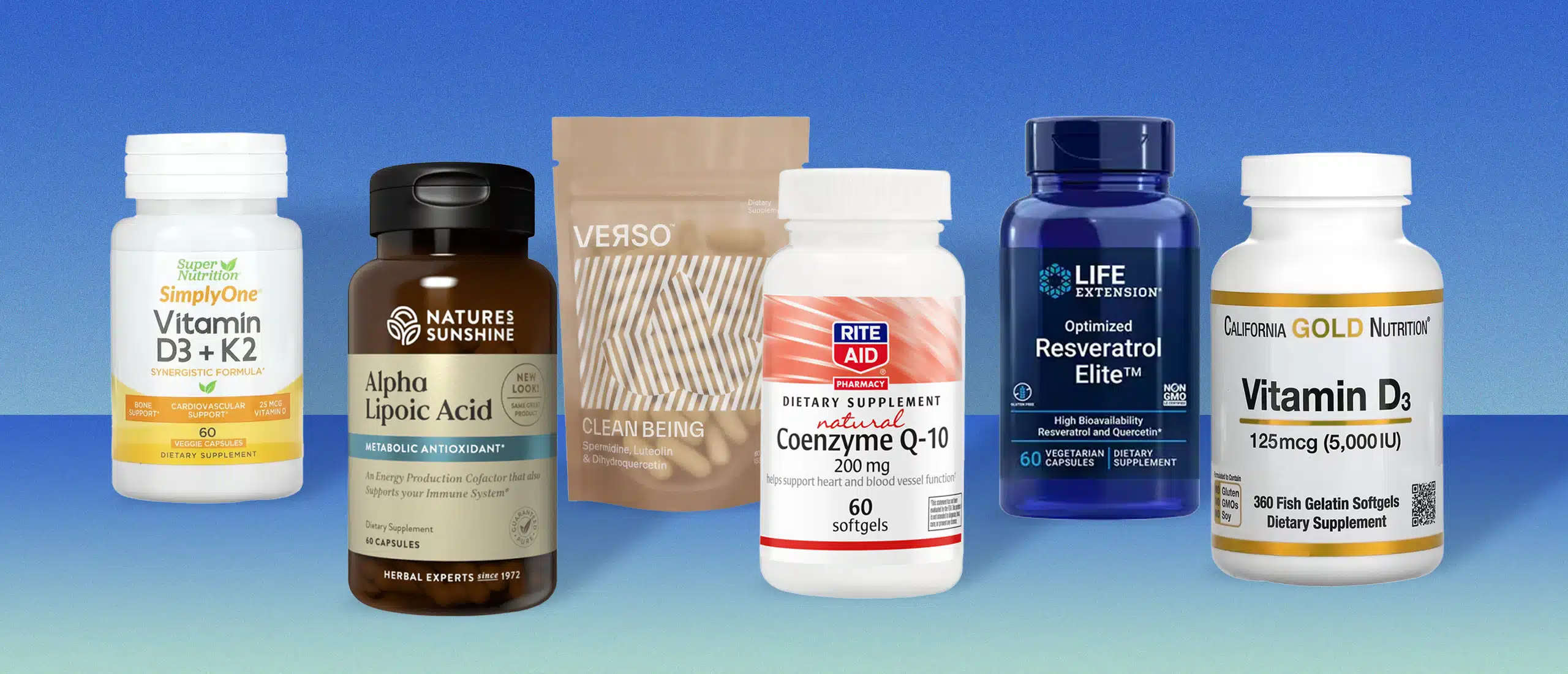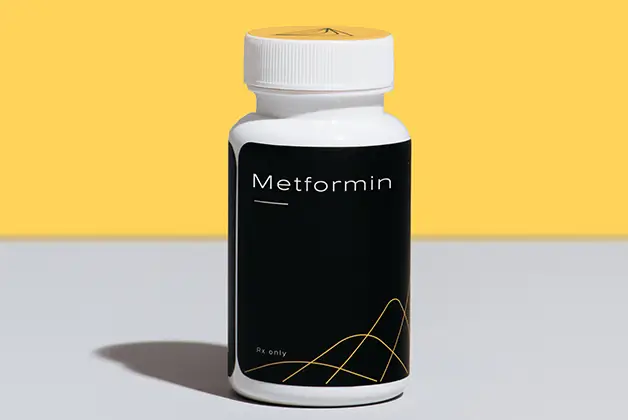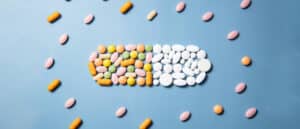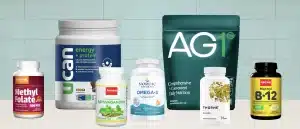What Supplements Does David Sinclair Take?
- By Rebekah Harding
- Fact-checked by Joy Ferguson
- November 1, 2023
Biological aging specialist, and the Lifespan podcast host David Sinclair, Ph.D., has his healthspan-boosting supplement stack down to a science—literally.
Sinclair recently garnered attention for his research with mice that suggests there may be a new way to reverse the signs of aging (1). The study, published in 2023, found that the epigenome may be key. Within the complete set of DNA in a cell (genome), all of the modifications that regulate the expression or activity of the genes, determining whether they turn on or off, is known as the epigenome.
“There’s growing evidence that aging has a significant epigenetic component; that is, the process by which stretches of DNA or the genes are turned on and off,” says Sinclair.
Sinclair believes that epigenetic changes are driven by the ongoing process of DNA breakage and repair. This new research goes against the widely held belief that damaged DNA causes irreversible aging. Sinclair’s research suggests that we may be able to “reboot” our epigenomes, essentially giving them instructions that might reverse the aging process.
It makes sense, then, that the 53-year-old Lifespan author uses the latest research on epigenetic aging to select his own supplements, like NMN and resveratrol, which he has said that he takes himself (2, 3).
Most of us don’t have the creds to do our own scientific research on the supplements we take, so it’s a good idea to look into the picks of someone who can.
Here are 10 pills and powders—6 over-the-counter, 2 prescription, and 1 recently banned as a supplement—that Sinclair has said he takes to help boost his longevity.
David Sinclair’s Longevity Supplements
Resveratrol
This compound is found in red wine (4), but you can reap its potential anti-aging benefits without risking alcohol-induced inflammation by taking this anti-aging supplement.
Sinclair has published research on resveratrol’s potential lifespan-extending benefits on mice. Some studies have suggested that resveratrol may help boost longevity in humans by reducing oxidative stress (5), relieving inflammation (6) and playin a role in alleviating insulin sensitivity (7).
In 2019, Sinclair told Rhonda Patrick that he takes resveratrol, “about a gram or so every morning in my yogurt” because “it may help my cardiovascular system.”this anti-aging supplement.
Vitamin D3
Some studies have found vitamin D supports longevity by improving bone health and strength (8), reducing inflammation (9), and decreasing the risk of cancer mortality (10). It may even help your testes produce testosterone (11).
“Doctors recommend all adults should take a daily supplement containing 400-4000 IU of vitamin D throughout the year, including in the winter months,” Sinclair tweeted in 2020.
“I take at least 2,500 IU daily,” said Sinclair in a 2022 interview. “Vitamin D is very important for health and longevity in the long run, and also for your immunity against viruses.”
Vitamin K2
Vitamin D3 helps the body absorb calcium, which is necessary for maintaining healthy bones (8). However, without adequate vitamin K2, calcium may accumulate in your arteries and increase your risk of heart disease (12). Put simply, vitamin K2 helps to move calcium from your blood to your bones, where it may better protect against age-related bone weakening.
Vitamin K2 may also support brain health and cognitive function in older adults, according to one study, published in 2021 (13). In another study, researchers suggested that vitamin K may have had a beneficial effect on muscle quality based on physical performance scores (14).
Vitamin K2 is best paired with D3 to boost the longevity supporting effects of both vitamins, according to a review of studies published in 2017 in the International Journal of Endocrinology, which concluded “Current evidence supports the notion that joint supplementation of vitamins D and K might be more effective than the consumption of either alone for bone and cardiovascular health” (15).
Sinclair takes vitamin K2 with D3 “for my blood vessels,” he said in a 2021 online interview with heart surgeon Dr. Steven Gundry.
Alpha lipoic acid (ALA)
In a 2021 interview with Bulletproof Diet creator Dave Asprey, Sinclair said that he takes around 500 mg of ALA every day. And he’s not alone. Many longevity experts swear by this supplement for its mitochondria supporting benefits, which may help increase your lifespan. The mitochondrial theory of aging suggests that an accumulation of damage to the mitochondria as you age may be associated with oxidative stress (16).
He says she started taking ALA after meeting Denham Harman, M.D, Ph.D, who he says is known for the free radical theory of aging.
“His family let me in on a little secret, which was that Denham had been taking alpha lipoic acid for years, most of his life,” says Sinclair. “Denham worked until his early 90s,” Sinclair tells Asprey. “I figured, well, if it didn’t hurt him….”
You don’t have to spend a ton of money on an expensive ALA supplement. Sinclair says he opts for the “bulk, cheap stuff.”
Coenzyme Q
CoQ10, or coenzyme Q10, is an antioxidant your cells use for growth and maintenance. As well, some studies have found that it may improve symptoms of congestive heart failure (17), help delay the progression of dementia (18), and may have anti-inflammatory effects (19).
Sinclair tweeted in 2020 that he takes coQ10 nightly because he takes a statin. Statins are a type of drug that were traditionally used to lower cholesterol, but are now thought to benefit people at risk for heart disease because they can reduce the risk and help protect against cardiovascular disease.
While this class of medication is effective in lowering high cholesterol, it can also also lower your body’s level of coQ10.
Spermidine
This supplement may help boost testosterone and sexual function in men, according to one trial (20). Spermidine may also help promote longevity by inducing autophagy, a process in which the body breaks down and reuses old or damaged cell parts (21).
“I’ve recently started taking spermidine as well, because we want to induce autophagy. And that would help induce what fasting would already do or it would help accentuate the benefits of fasting,” said Sinclair on an Instagram Live with Chef Serena Poon.
Nicotinamide mononucleotide (NMN)
If you live in the U.S., you’ll have a harder time getting your hands on this supplement. In November 2022, the FDA banned the sale of NMN to investigate its potential as a new drug. There was some initial controversy that pointed to a company Sinclair co-founded, MetroBiotech, potentially being behind the ban. Sinclair denied these rumors.
Through a series of chemical processes, NMN is turned into NAD+ (nicotinamide adenine dinucleotide), a coenzyme that plays a role in major age-related biological processes including metabolism, immune system activity, and DNA repair.
Why doesn’t Sinclair take NAD+ directly?
“NADH and NAD are larger molecules and NMN is a precursor building block. It’s small enough that it does get taken up into cells. That’s why I take NMN,” Sinclair explained in a September 2022 interview with Reverse Aging Revolution.
In a study that Sinclair calls “one of the real first proofs that NMN does something in humans the way it works in mice,” subjects were given 250 mg of NMN for 10 weeks. The researchers found improved insulin sensitivity, which Sinclair calls a “hallmark of longevity.” (22)
If you’re interested in the benefits of NMN supplements, you can take NAD+.
Prescription Medications
Statins
On the Joe Rogan Experience podcast, Sinclair said that he has been taking a preventative dose of statins since he was 29 due to his family history. This class of drugs work by inhibiting cholesterol production in the liver, according to the Centers for Disease Control and Prevention (CDC).
“23andMe basically said, ‘Give up now.’ It’s pretty horrible,” Sinclair told Rogan about discovering his predisposition to heart problems.Since then, he’s been on 80mg of a statin.
There’s a small pool of evidence that suggests that statins may also support longevity by potentially lowering your risk for other age-related diseases like cancer and dementia (23, 24).
Metformin
Doctors prescribe metformin to lower blood sugar levels in type 2 diabetes patients. But emerging evidence suggests that the drug may also have potential as a longevity booster because it may help alleviate oxidative stress and have anti-inflammatory properties (25, 26).
Sinclair takes metformin to help turn on sirtuins. “Sirtuins are enzymes that fight diseases,” he explains.
In 2021, Sinclair said that he takes metformin daily except for days when he goes to the gym—1 metformin daily.
If you’re interested in taking metformin to boost your longevity, Hone works with licensed medical providers who can prescribe metformin if they think it’s right for you.
Metformin may help you lose weight and ward off age-related illnesses.
References
1. Yang JH, et al. (2023). Loss of epigenetic information as a cause of mammalian aging.
2. Chen X, et al (2020). Neuroprotective effects and mechanisms of action of nicotinamide mononucleotide (NMN) in a photoreceptor degenerative model of retinal detachment.
3. Pollack RM, et al. (2017). Resveratrol Improves Vascular Function and Mitochondrial Number but Not Glucose Metabolism in Older Adults.
4. Weiskirchen S, Weiskirchen R. (2016). Resveratrol: How Much Wine Do You Have to Drink to Stay Healthy?
5. Gu, Tongyu et al. (2021). Antioxidative Stress Mechanisms behind Resveratrol: A Multidimensional Analysis
6. Meng T, et al (2021). Anti-Inflammatory Action and Mechanisms of Resveratrol. Molecules.
7. Wong RHX, Howe PRC. (2018). Resveratrol Counteracts Insulin Resistance-Potential Role of the Circulation.
8. Burt LA, et al (2019). Effect of High-Dose Vitamin D Supplementation on Volumetric Bone Density and Bone Strength: A Randomized Clinical Trial.
9. Liu W, et al (2018). The Anti-Inflammatory Effects of Vitamin D in Tumorigenesis.
10. Zhang Y, et al. (2019). Association between vitamin D supplementation and mortality: systematic review and meta-analysis
11. Santos HO, et al (2020). Reviewing the Evidence on Vitamin D Supplementation in the Management of Testosterone Status and Its Effects on Male Reproductive System (Testis and Prostate): Mechanistically Dazzling but Clinically Disappointing.
12. Hariri E, et al (2021). Vitamin K2—a neglected player in cardiovascular health: a narrative review
13. Maresz K. (2021). Growing Evidence of a Proven Mechanism Shows Vitamin K2 Can Impact Health Conditions Beyond Bone and Cardiovascular.
14. Azuma K, et al (2019). Multiple Modes of Vitamin K Actions in Aging-Related Musculoskeletal Disorders.
15. van Ballegooijen AJ, et al (2017). The Synergistic Interplay between Vitamins D and K for Bone and Cardiovascular Health: A Narrative Review.
16. Chistiakov DA, et al (2014). Mitochondrial aging and age-related dysfunction of mitochondria.
17. Di Lorenzo A, et al (2020). Clinical Evidence for Q10 Coenzyme Supplementation in Heart Failure: From Energetics to Functional Improvement.
18. Chang Po-Sheng, et al (2022). Investigation of coenzyme Q10 status, serum amyloid-β, and tau protein in patients with dementia
19. Sifuentes-Franco S, et al (2022). Antioxidant and Anti-Inflammatory Effects of Coenzyme Q10 Supplementation on Infectious Diseases.
20. Bendera, R. and Wilson, L. (2019) The Regulatory Effect of Biogenic Polyamines Spermine and Spermidine in Men and Women.
21. Hofer, S.J., et al. (2022). Mechanisms of spermidine-induced autophagy and geroprotection.
22. Yoshino M, et al (2021). Nicotinamide mononucleotide increases muscle insulin sensitivity in prediabetic women.
23. Jiang, W., et al. (2021). Statins: a repurposed drug to fight cancer.
24. Schultz BG, et al (2018). The role of statins in both cognitive impairment and protection against dementia: a tale of two mechanisms.
25. Bai Bo, et al (2021). Metformin: A Novel Weapon Against Inflammation
26. Huiwen Ren, et al (2020). Metformin alleviates oxidative stress and enhances autophagy in diabetic kidney disease via AMPK/SIRT1-FoxO1 pathway.















